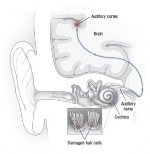David Baxter PhD
Late Founder
Tinnitus: What to do about ringing in the ears
September 26, 2011
by Carolyn Schatz, Editor, Harvard Women's Health Watch
At one time or another, almost everyone experiences a ringing in their ears. It?s common after sitting through a loud concert or an exuberant football game, or after taking aspirin or an antibiotic for a while. But as many as 50 million Americans have chronic tinnitus (pronounced tih-NITE-us or TIN-ih-tus)?a constant ringing, whistling, buzzing, chirping, hissing, humming, roaring, or even shrieking. (If you don?t have tinnitus, you can get an idea of what people with the condition hear at the American Tinnitus Association?s Web site.)
Chronic tinnitus can be caused by a variety of things, from impacted ear wax to medications that damage nerves in the ear, middle ear infection, and even aging. Damage to hair cells in the ear?s cochlea (see the illustration below) are suspected as a common pathway for these causes. As I write in the September issue of the Harvard Women?s Health Watch, chronic tinnitus can also be a symptom of M?ni?re?s disease, a disorder of the balance mechanism in the inner ear. (You can read the full article here.)
Managing tinnitus
When chronic tinnitus is caused by a definable problem, like ear wax or grinding your teeth at night or taking aspirin, addressing that problem will often turn down the volume. Otherwise, several strategies can help make tinnitus less bothersome.
One of the simplest approaches is masking the noise. You can do this by listening to music or having a radio, fan, or white-noise machine going in the background. If money is no issue, you can buy devices worn like hearing aids that generate low-level white noise. Although there isn?t enough evidence from randomized trials to draw any conclusions about the effectiveness of masking, hearing experts often recommend it before turning to more expensive options such as cognitive behavioral therapy, tinnitus retraining therapy, biofeedback and stress management, and transcutaneous electrical stimulation of parts of the inner ear.
Not all insurance companies cover tinnitus treatments in the same way, so be sure to check your coverage. If you?re willing to enroll in a research study, you may be able to receive a cutting-edge treatment free. (For more information, go to www.clinicaltrials.gov, and enter the search term ?tinnitus.?)

Hair cells in the cochlea transform sound waves into electrical signals that travel to the brain's auditory cortex. When these cells are damaged by loud noise, medications, or other problematic inputs, brain circuits don't receive the signals they are expecting to get. They respond by generating abnormal activity, which results in the illusion of sound, which is tinnitus.
September 26, 2011
by Carolyn Schatz, Editor, Harvard Women's Health Watch
At one time or another, almost everyone experiences a ringing in their ears. It?s common after sitting through a loud concert or an exuberant football game, or after taking aspirin or an antibiotic for a while. But as many as 50 million Americans have chronic tinnitus (pronounced tih-NITE-us or TIN-ih-tus)?a constant ringing, whistling, buzzing, chirping, hissing, humming, roaring, or even shrieking. (If you don?t have tinnitus, you can get an idea of what people with the condition hear at the American Tinnitus Association?s Web site.)
Chronic tinnitus can be caused by a variety of things, from impacted ear wax to medications that damage nerves in the ear, middle ear infection, and even aging. Damage to hair cells in the ear?s cochlea (see the illustration below) are suspected as a common pathway for these causes. As I write in the September issue of the Harvard Women?s Health Watch, chronic tinnitus can also be a symptom of M?ni?re?s disease, a disorder of the balance mechanism in the inner ear. (You can read the full article here.)
Managing tinnitus
When chronic tinnitus is caused by a definable problem, like ear wax or grinding your teeth at night or taking aspirin, addressing that problem will often turn down the volume. Otherwise, several strategies can help make tinnitus less bothersome.
One of the simplest approaches is masking the noise. You can do this by listening to music or having a radio, fan, or white-noise machine going in the background. If money is no issue, you can buy devices worn like hearing aids that generate low-level white noise. Although there isn?t enough evidence from randomized trials to draw any conclusions about the effectiveness of masking, hearing experts often recommend it before turning to more expensive options such as cognitive behavioral therapy, tinnitus retraining therapy, biofeedback and stress management, and transcutaneous electrical stimulation of parts of the inner ear.
Not all insurance companies cover tinnitus treatments in the same way, so be sure to check your coverage. If you?re willing to enroll in a research study, you may be able to receive a cutting-edge treatment free. (For more information, go to www.clinicaltrials.gov, and enter the search term ?tinnitus.?)

Hair cells in the cochlea transform sound waves into electrical signals that travel to the brain's auditory cortex. When these cells are damaged by loud noise, medications, or other problematic inputs, brain circuits don't receive the signals they are expecting to get. They respond by generating abnormal activity, which results in the illusion of sound, which is tinnitus.
